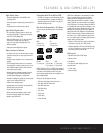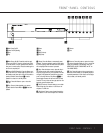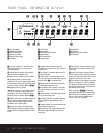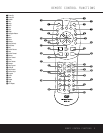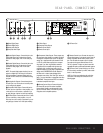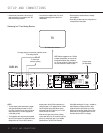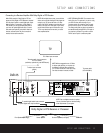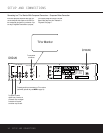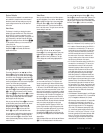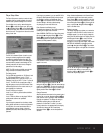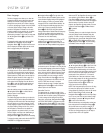
SETUP AND CONNECTIONS 13
SETUP AND CONNECTIONS
When DVDs encoded in Dolby Digital or DTS are
played, the Dolby Digital or DTS bitstream is outputted
from the player’s optical or coaxial digital audio output.
When the player is connected to a Dolby Digital or
DTS decoder, you can enjoy theater-quality audio in
your home. An optical digital audio cable or coaxial
audio cable (both optional) is required for these con-
nections, as shown below. Only one connection is
needed, not both at the same time.
• NOTE: With multiple video sources, your audio/video
device can be used for selecting the video signal and
routing it to the TV. Connect the video or S-Video
output of the DVD 25 (whatever is provided with your
device) to the video or S-Video input on your device,
and the video/S-Video output of this device to your
TV. For more details, see the manual of your audio/
video amplifier/receiver.
• NOTE FOR ANALOG AUDIO: The connection from
Audio Out to the TV is optional. If you plan on using
your DVD 25 alone, without turning on your
complete system, this connection must be made;
then you can turn up the TV´s volume as needed.
The analog audio jacks may also be connected to
the standard analog left/right DVD or CD inputs on
your receiver to processor if you wish to use the
DVD 25 as the input for a multiroom system.
Connecting to a Receiver/Amplifier With Dolby Digital or DTS Decoder
VIDEO OUT/COMPONENT
CLASS 1 LASER PRODUCT
KLASSE 1 LASER PRODUKT
LUOKAN 1 LASER LAITE
KLASS 1 LASER APPARAT
20
Y / Y
Pb/ Cb
Pr/ Cr
120V/60Hz
1
TV
To power outlet
(AC 120V/60Hz)
To S-Video input connector
To analog audio input connectors
on TV or receiver
(red/white, optional only, see NOTE above)
Front Speaker (Left/Right) Center Speaker Surround Speaker (Left/Right) Subwoofer
To video input connector
(yellow)
Dolby Digital or DTS Receiver or Processor
DVD 25
To coaxial digital audio input connector
To optical digital audio input connector
NOTE: While we suggest the use of S-Video
for higher quality pictures, you may also use
the standard composite video connection if
your TV does not have an S-Video input. Only
one video connection is needed, not both.
NOTE: Only one digital connection is required.
You may use either optical or coaxial according
to the requirements of your system.



